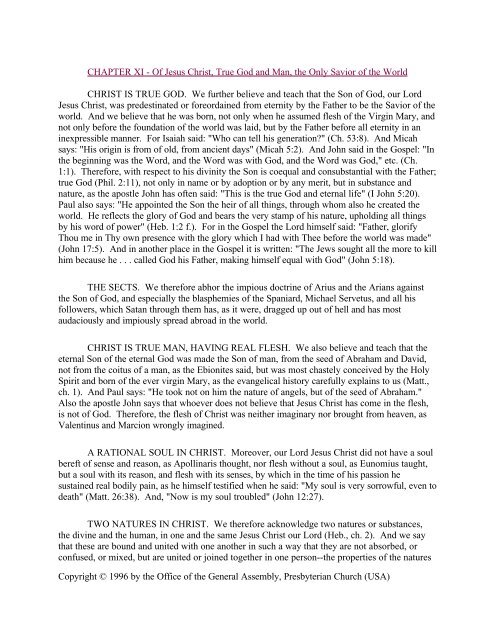The Book of Confessions - The Presbyterian Leader
The Book of Confessions - The Presbyterian Leader
The Book of Confessions - The Presbyterian Leader
Create successful ePaper yourself
Turn your PDF publications into a flip-book with our unique Google optimized e-Paper software.
CHAPTER XI - Of Jesus Christ, True God and Man, the Only Savior <strong>of</strong> the World<br />
CHRIST IS TRUE GOD. We further believe and teach that the Son <strong>of</strong> God, our Lord<br />
Jesus Christ, was predestinated or foreordained from eternity by the Father to be the Savior <strong>of</strong> the<br />
world. And we believe that he was born, not only when he assumed flesh <strong>of</strong> the Virgin Mary, and<br />
not only before the foundation <strong>of</strong> the world was laid, but by the Father before all eternity in an<br />
inexpressible manner. For Isaiah said: "Who can tell his generation?" (Ch. 53:8). And Micah<br />
says: "His origin is from <strong>of</strong> old, from ancient days" (Micah 5:2). And John said in the Gospel: "In<br />
the beginning was the Word, and the Word was with God, and the Word was God," etc. (Ch.<br />
1:1). <strong>The</strong>refore, with respect to his divinity the Son is coequal and consubstantial with the Father;<br />
true God (Phil. 2:11), not only in name or by adoption or by any merit, but in substance and<br />
nature, as the apostle John has <strong>of</strong>ten said: "This is the true God and eternal life" (I John 5:20).<br />
Paul also says: "He appointed the Son the heir <strong>of</strong> all things, through whom also he created the<br />
world. He reflects the glory <strong>of</strong> God and bears the very stamp <strong>of</strong> his nature, upholding all things<br />
by his word <strong>of</strong> power" (Heb. 1:2 f.). For in the Gospel the Lord himself said: "Father, glorify<br />
Thou me in Thy own presence with the glory which I had with <strong>The</strong>e before the world was made"<br />
(John 17:5). And in another place in the Gospel it is written: "<strong>The</strong> Jews sought all the more to kill<br />
him because he . . . called God his Father, making himself equal with God" (John 5:18).<br />
THE SECTS. We therefore abhor the impious doctrine <strong>of</strong> Arius and the Arians against<br />
the Son <strong>of</strong> God, and especially the blasphemies <strong>of</strong> the Spaniard, Michael Servetus, and all his<br />
followers, which Satan through them has, as it were, dragged up out <strong>of</strong> hell and has most<br />
audaciously and impiously spread abroad in the world.<br />
CHRIST IS TRUE MAN, HAVING REAL FLESH. We also believe and teach that the<br />
eternal Son <strong>of</strong> the eternal God was made the Son <strong>of</strong> man, from the seed <strong>of</strong> Abraham and David,<br />
not from the coitus <strong>of</strong> a man, as the Ebionites said, but was most chastely conceived by the Holy<br />
Spirit and born <strong>of</strong> the ever virgin Mary, as the evangelical history carefully explains to us (Matt.,<br />
ch. 1). And Paul says: "He took not on him the nature <strong>of</strong> angels, but <strong>of</strong> the seed <strong>of</strong> Abraham."<br />
Also the apostle John says that whoever does not believe that Jesus Christ has come in the flesh,<br />
is not <strong>of</strong> God. <strong>The</strong>refore, the flesh <strong>of</strong> Christ was neither imaginary nor brought from heaven, as<br />
Valentinus and Marcion wrongly imagined.<br />
A RATIONAL SOUL IN CHRIST. Moreover, our Lord Jesus Christ did not have a soul<br />
bereft <strong>of</strong> sense and reason, as Apollinaris thought, nor flesh without a soul, as Eunomius taught,<br />
but a soul with its reason, and flesh with its senses, by which in the time <strong>of</strong> his passion he<br />
sustained real bodily pain, as he himself testified when he said: "My soul is very sorrowful, even to<br />
death" (Matt. 26:38). And, "Now is my soul troubled" (John 12:27).<br />
TWO NATURES IN CHRIST. We therefore acknowledge two natures or substances,<br />
the divine and the human, in one and the same Jesus Christ our Lord (Heb., ch. 2). And we say<br />
that these are bound and united with one another in such a way that they are not absorbed, or<br />
confused, or mixed, but are united or joined together in one person--the properties <strong>of</strong> the natures<br />
Copyright © 1996 by the Office <strong>of</strong> the General Assembly, <strong>Presbyterian</strong> Church (USA)




